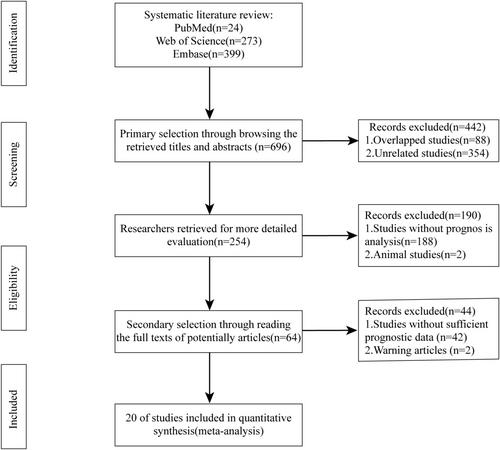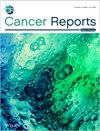Survival and Clinicopathological Significance of CD47 in Human Solid Tumors: An Updated Systematic Reviews and Meta-Analysis
Abstract
Background
High expression levels of cluster of differentiation 47 (CD47) have been recognized as poor survival in several different cancers. Nevertheless, the significance of CD47 in patients with solid tumors remains controversial.
Aims
The objective of this study is to elucidate whether elevated CD47 expression independently predicts a poor prognosis across solid tumors through pooled survival and clinicopathological analyses.
Methods and Results
This meta-analysis was based on a search of PubMed, Embase, and Web of Science databases to obtain 20 eligible published studies (totaling 4019 patients) between January 2018 and January 2024. The combined hazard ratios (HRs) for overall survival (OS) were evaluated, and the HRs for relapse-free survival (RFS), progression-free survival (PFS), and disease-free survival (DFS), as well as odds ratios for clinicopathological data, were also respectively combined. The data obtained from these studies were extracted from these published studies and analyzed. This study suggested that CD47 overexpression was related to shorter OS times in human solid tumors, with a combined HR for OS (according to the univariate analysis) of HR = 1.63 (95% confidence intervals,[ 95% CIs]: 1.45–1.83; p < 0.00001), and a pooled HR for OS (according to the multivariate analysis) of HR = 2.02 (95% CI: 1.43–2.84; p < 0.0001). The subgroup analysis revealed that CD47 overexpression was related to inferior OS rates according to country, cancer type, sample size, analysis type, and the method via which the HR value was obtained (i.e., reported or extracted; p < 0.05); in addition, a high expression level of CD47 was also a predictor of poor DFS, PFS, and RFS rates (p < 0.00001). Certain factors, such as age (≥ 60 years old), lymph node metastasis, TNM staging, differentiation type, and tumor recurrence, resulted in an upregulation of CD47 (p < 0.05).
Conclusion
This meta-analysis indicates that CD47 overexpression is significantly associated with poor clinical outcomes, advanced clinical stages, and poor differentiation in solid tumor patients, particularly, in cases involving tumors in the digestive and respiratory systems. These findings suggest that CD47 could serve as a valuable prognostic biomarker and therapeutic target.


 求助内容:
求助内容: 应助结果提醒方式:
应助结果提醒方式:


